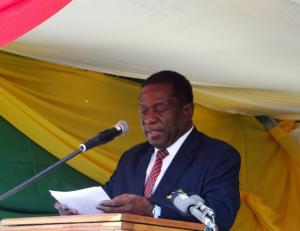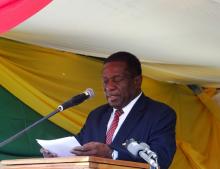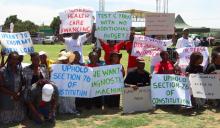Zimbabwe scores big on HIV control
Kwekwe, 1 December 2016 - This was said by the Honorable E.D. Mnangagwa, Vice President of the Republic of Zimbabwe and Minister of Justice, Legal and Parliamentary Affairs, during the commemoration of World AIDS Day in Kwekwe under the theme Closing the tap of new infections. The government has disclosed the fall of new HIV infections in the country by 50% in the last 7 years. Presenting his statement at the commemoration, Hon. Mnangagwa announced that the country had recorded an equally impressive drop of more than 50% in HIV prevalence; a drop in HIV-related deaths which fell from 3 000 a week to 900 during the same period; and an impressive viral load suppression of 84% for those on Anti Retroviral Therapy (ART).
All in all, new HIV infections dropped from an estimated 82 570 in 2009 to 42 314 in 2016, raising hopes that Zimbabwe is on course to achieve its ambitious target to manage the pandemic by 2030. Honorable Mnangagwa also commended the Ministry of Health and Child Care and their partners for launching the Start Free, Stay Free, AIDS free framework in November 2016, which is a strategy to close the tap on new infections targeting pregnant and breastfeeding mothers; adolescents, and young people. He, however, urged the Ministry of Health and Child Care, National AIDS Council, and partners to expand provision of and access to viral load testing services in line with the third 90% in the fast track targets. “Viral load testing is essential to ascertain the health status, and how well ART is controlling the virus,” said Honorable Mnangagwa. The same sentiments on viral load testing machines were also echoed by the people living with HIV.
Speaking on behalf of the UN, Dr David Okello, WHO Representative said the UN in Zimbabwe is providing support to key Government and civil society institutions to effectively and efficiently manage a multi-sectoral AIDS response. Dr Okello also introduced the new WHO guidelines on HIV self-testing and partner notification services. These guidelines recommend HIV self-testing and voluntary assisted partner notification services be offered as additional HIV testing approaches. The evidence presented in the WHO guidelines shows HIV self-testing can double the uptake of testing among men and key populations – both of which are groups at risk for HIV but who are less likely to be tested. “Adoption of HIV self-testing and voluntary assisted partner notification services is recommended if Zimbabwe is to achieve its first 90 goal, reaching 90% of all people living with HIV with testing services by 2020,” said Dr Okello. He also acknowledged the work done by the Government of Zimbabwe in the fight against HIV and AIDS, and reiterated the commitment of the UN to support the Government of Zimbabwe. “We thank the Government of Zimbabwe for its genuine commitment and leadership to ending AIDS by 2030. The UN System is committed to continue and strengthen our partnership and collaboration to accelerate efforts to end the epidemic in Zimbabwe,” he said.
World AIDS Day commemorations were hosted in Kwekwe in Midlands Province. Kwekwe is the district with the highest HIV prevalence rates in the country. Kwekwe is at highest risk because one of the country’s major highways cuts through it, it has a high population of artisanal miners and an active farming community. It is hoped that the national attention, and all the pre and post launch activities and interventions would go a long way in raising awareness and influencing behavior change.








